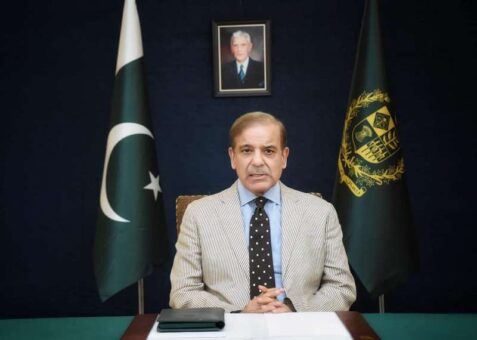Islamabad, August 18, 2025 – Prime Minister Shehbaz Sharif has announced that his cabinet members will donate one month’s salary to help flood-stricken families in Khyber Pakhtunkhwa, Gilgit-Baltistan, and Azad Jammu and Kashmir.
Chairing a high-level meeting on Monday, the premier reaffirmed the federal government’s “complete and unwavering” support for communities devastated by heavy monsoon rains and flash floods.
The meeting reviewed ongoing rescue and rehabilitation operations across the affected regions. Shehbaz directed federal institutions to accelerate relief work, underlining that “in this hour of calamity, there is no federal or provincial divide; we must stand united as Pakistanis to heal the wounds of our distressed brothers and sisters.” He stressed that the focus must remain solely on service, not politics.
Federal Relief and Monitoring Plan
The prime minister outlined a multi-tiered response. The Minister for Kashmir Affairs and Gilgit-Baltistan will supervise relief and rehabilitation activities, while federal ministers have been instructed to personally visit affected districts. Restoration of electricity, drinking water, roads, and bridges has been declared a top priority. The Ministry of Communications, the National Highway Authority (NHA), and the Frontier Works Organization (FWO) have been tasked with ensuring quick repair of highways and damaged bridges.
Shehbaz specifically directed the Minister for Power to inspect flood-hit areas and prioritize electricity restoration. The National Disaster Management Authority (NDMA) has been asked to finalize damage assessments and design a comprehensive plan for distributing food, tents, medicines, and other essentials. The Ministry of Finance will provide resources to NDMA without delay.
Medical teams and medicines will be dispatched by the Ministry of Health, while mobile camps will be set up in hard-to-reach regions. The Benazir Income Support Programme (BISP) will extend emergency financial assistance to the displaced and vulnerable families. Federal ministers were told to remain on the ground “until the last affected person receives assistance.”
Ongoing Relief Efforts
NDMA officials briefed the meeting that 456 relief camps have been established and more than 400 rescue operations conducted with support from the Pakistan Army and provincial governments. Relief convoys carrying essential supplies are being dispatched daily, with priority given to areas most severely hit by floods and landslides.
Preliminary estimates suggest that damages to public and private property have already exceeded Rs. 126 million. Trucks carrying rations, tents, medicines, and water purification units are being mobilized, though NDMA emphasized that quantities must be scaled up to meet growing needs.
Monsoon Outlook and Risks
The Meteorological Department informed the cabinet that the current monsoon season is likely to continue until late September. Six major spells of rain have already battered northern and western Pakistan, with two more significant spells forecast in the coming weeks. Torrential downpours could increase the risk of flash floods in local streams and rivers, as well as landslides in hilly areas like Murree, Galliyat, Swat, and Gilgit-Baltistan.
The prime minister also directed NHA and Communications Ministry to ensure roads remain open for relief convoys and emphasized that “routes must be cleared without differentiating between provincial or national highways.”
A Collective Responsibility
At the conclusion of the meeting, Shehbaz led a prayer for the departed souls and the speedy recovery of the injured. He reminded participants that helping disaster victims was a “national duty that transcends politics and boundaries.” The premier praised the armed forces, NDMA teams, provincial governments, and volunteers who have been working round the clock.
The session was attended by senior ministers including Khawaja Asif, Ahsan Iqbal, Ahad Khan Cheema, Attaullah Tarar, along with NDMA Chairman Lieutenant General Inam Haider Malik, Prime Minister’s Chief Coordinator Musharraf Zaidi, and other senior officials.
Shehbaz emphasized that the government’s response would be measured not in speeches but in tangible actions that restore hope for flood-affected communities. He reiterated his government’s commitment to stand shoulder-to-shoulder with every Pakistani affected by the floods.
